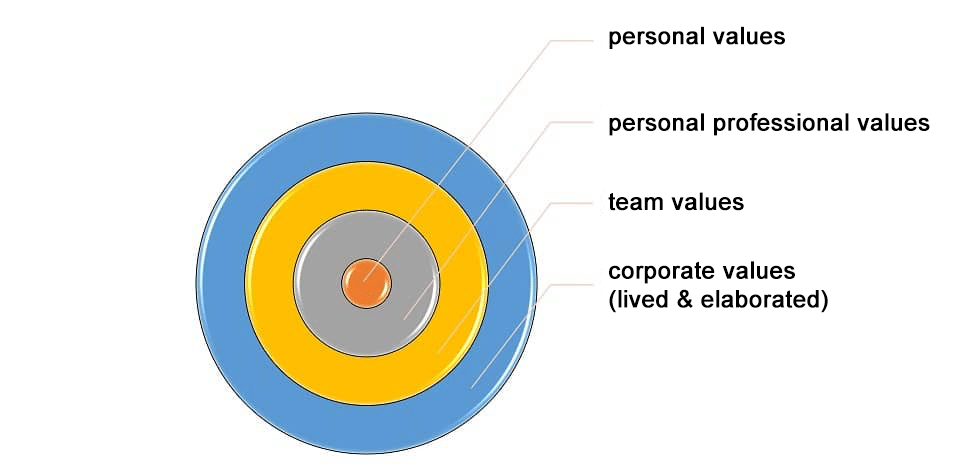Values in organisations
Values influence how we make decisions, how we deal with other people, how we present ourselves to the outside world and how we behave. Here are some examples of personal beliefs, attitudes and ideals:
- Gratitude
- Discipline
- Honesty
- Peacefulness
- Harmony
- Courage
Individual lives are guided by these values. If they are violated, conflicts arise. It does not matter whether a person acts contrary to his or her convictions or whether the violation is caused by other people. This understanding is so important in a professional context, when working in organisations or companies, that I would like to go into it in more detail.
The community of values
A community of people who share common values and express them consciously or unconsciously is a community of values.¹ Such communities can be found among friends, in sports, in clubs, in associations or in companies. When people join an existing community of values, ideas are (mostly unconsciously) compared. If they fit together, the community grows. Of course, new values can also find their way into the community and existing attitudes and convictions can change over time.
It can often be observed that new values of the community complement personal attitudes. However, it becomes challenging for those involved when the “new” contradicts community values, negatively influences them in the long term or even destroys them. In this context, one speaks of toxic values.
Corporate and organisational values
Do you know the values of the company or organisation in which you are active? How are they communicated? How are they lived? Do they provide orientation even if they have never been discussed or documented?
We can spend a long time on these questions alone, because values are the basis for the vast majority of working communities! Ideally, they should be recorded in a company or organisation and communicated transparently. Because it is about commonalities of all contributors, it is about something that connects everyone with each other.
Example: A conversation in a job interview
An acquaintance told me about her job interview at a personnel services company. “I like the values of your company,” she said to the manager. He then explained that they were “external” values, the internal ones were different, they were not on the website and they were not the same as the “external” ones. Surprised, the HR manager asked the manager which internal values he meant, because he had never heard of them.
Of course, my acquaintance did not decide to join the company. For many people, values are more than just content for pretty websites.
Since attitudes and convictions are always reflected in the corporate culture, it can be assumed in the example that the culture in the organisation is also contradictory. The influence of values on culture, in both directions, is immense. And so it becomes clear why differences and conflicts sometimes arise: values are violated and this makes people ill in the long run.
Influence of values on culture and ultimately on the whole organisation or company
As described earlier: Values change over time, especially when employees leave an organisation or new ones join. The respective influence on the organisation depends, among other things, on the size of the organisation: in smaller companies, every change has an impact on the company values; in medium-sized and larger companies, this is only the case to a limited extent – for example, when the management changes, there is a high turnover or there are mergers and acquisitions.
In short: it is individual how company values change. This is exactly where we come to the individual values of the people involved.
Values of people and organisations
When we look at corporate or organisational values in conjunction with a person’s individual values, there is often a discrepancy. At first glance this may seem surprising, but it is relatively easy to explain: If a person has decided to work in a company, then the company values will probably not completely contradict the individual personal values. However, they do not have to be adapted 100 % either. Example: “Sustainability” is important to a person. The company where the person works is interested in “long-term customer relationships”. These values are not 100% congruent, but they are close to each other.
This is exactly where a dilemma lies: personal and corporate values can differ and sometimes even not have much in common at first glance. This is normal in itself, because every working person has personal and personal professional values:
Personal values
Personal values guide every person, provide direction and a moral compass. In the world of work, however, obstacles can arise. Example: “peacefulness” is important for a person. Working for an arms company is therefore likely to contradict the person’s moral compass. However, if the personal professional values make a connection right here, cooperation can still work.
Personal professional values
Personal values are always linked to professional values. They can be completely congruent (rare), but they do not have to be. The professional values are to be understood as an adaptation into the entrepreneurial world.
Let’s take the example of “peacefulness”: If the company attaches importance (!) to protecting people with its own products, there is an overlap with the personal values, whereby the personal professional value would not be “peacefulness” but, for example, “protection” or “safety”.
In other words, personal professional values are often shaped by the task, the environment and the content.
Bringing the values together
So now we have established that companies and organisations have values (whether they have been consciously or unconsciously codified), that people always have their own personal values and in the professional environment their personal professional values. Now it is a matter of bringing these together in the professional environment.
As described before, this is relatively easy in smaller companies: the company or organisational values usually have parallels to the personal professional values. In medium-sized and larger companies, this becomes more difficult due to the size, especially when corporate values are global, sometimes abstract, often open to free interpretation or arbitrary. However, since communities of values are created when people – for example in teams – work together, this is precisely where the key to bringing values together lies: Teams have their own values. They live and work by them. When new people join a team, not only the business values but also the values in the team are relevant. It is easy to observe this in teams where values are misunderstood and cooperation does not work; in such cases, no adequate result can emerge in the entrepreneurial context either.
Building up values
Conclusion
It is worthwhile to develop an awareness of values, as this can influence the corporate or organisational culture. If the personal values of the people in the company are respected and accepted, and if they coincide with the respective team or company values, a desirable “we” feeling often develops. A community is created!
So there are good reasons to deal with the personal, the personal professional, the team and the company or organisational values. The best thing to do is to start now.
Notes (partly in German):
[1] Werte Lexikon: Wertegemeinschaften
If you want to initiate changes in your company or organisation, then it is definitely worth taking a look at Stefan Wickenhaeuser’s great German blog.

Stefan Wickenhaeuser
Stefan Wickenhäuser deals with change in companies. He is NOT a trainer, speaker or consultant. He is a helper in the here and now. For the future and the change of people in companies.

